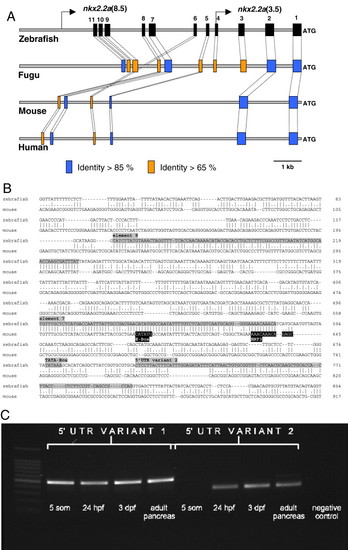Fig. 2
|
Sequence homology between the regulatory regions of zebrafish nkx2.2a and other vertebrate Nkx2.2 genes. (A) Schematic alignment of four vertebrate Nkx2.2 promoter regions (10 kb). Conserved sequence blocks in the zebrafish sequence are shown as black squares. The degree of identity between a given zebrafish element and the corresponding region in one of the other sequences is indicated by different colours, orange for > 65% identity and blue for > 85% identity. The promoter fragments used for the two transgenic lines are depicted in the zebrafish sequence. (B) Sequence alignment of the zebrafish genomic region containing elements 7 and 8 as well as a sequence identical to 52-region of the identified nkx2.2a EST harbouring an alternative 52UTR (‘variant2’) and the corresponding genomic sequence in mouse. Elements 7 and 8, the region corresponding to the alternative 52UTR and a putative TATA-box are shaded in grey. The conserved E-Box motif and the HNF3 binding motif in the mouse sequence are marked in black. (C) RT-PCR to identify the two variant nkx2.2a transcripts at various developmental stages. Note that mRNA variant 2 is not detectable before the onset of pancreatic hormone gene expression. |
| Gene: | |
|---|---|
| Fish: | |
| Anatomical Terms: | |
| Stage Range: | 5-9 somites to Adult |
Reprinted from Developmental Biology, 304(2), Pauls, S., Zecchin, E., Tiso, N., Bortolussi, M., and Argenton, F., Function and regulation of zebrafish nkx2.2a during development of pancreatic islet and ducts, 875-890, Copyright (2007) with permission from Elsevier. Full text @ Dev. Biol.

